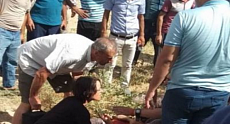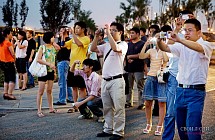Withdrawal of the military contingent from Afghanistan could contribute to increasing instability in Central Asia, said Karimov
Astana. November 25. Silkroadnews - Forced withdrawal of coalition of peacekeeping troops from Afghanistan could lead to a new phase of the civil war in the country and increase instability in Central Asia and beyond, tinks the president of Uzbekistan Islam Karimov.
"The consequences of this forced withdrawal of coalition forces can be counter-productive, that is even more activation of terrorist forces and, I would say, a possible decoupling of a new phase of civil war. And it is possible that maybe it will lead to what is happening today in Iraq, in Syria. A very dangerous expansion of fanatical Islamic forces, which are now terrorizing not only the mentioned territories, but also rapidly expand their influence on the surrounding area, especially in the Muslim world ",- quoted KazTAG Karimov after talks with Kazakh President Nursultan Nazarbayev on Tuesday .
"We are aware that taking place in world of politics and economics is a deep and complex process, the growing tension in the world, the confrontation, the unresolved Afghan problem, difficult to predict the effects of the forced withdrawal of peacekeeping coalition forces from Afghanistan, which could lead to an increase of threats and instability in Central Asian region and far beyond its borders", - he added.
According to him, the previous plan for Afghanistan, that was rejected by the former president Ahmad Karzai, now finds new opportunities for its implementation.
"As the President of the United States adopted a decree that the number of those who will remain in Afghanistan, is not 10-12 thousand. It will be much more, up to 90 thousand. This once again shows that plans still change",- said the president of Uzbekistan.
In his view, the United States maintains its desire to influence the situation in Afghanistan.
Recall the President of Uzbekistan Islam Karimov is on an official visit to Astana.


